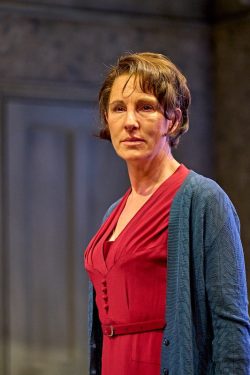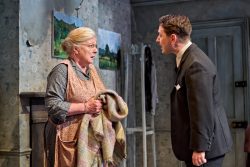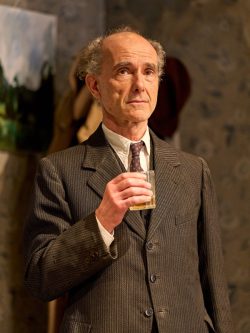 TERENCE Rattigan was the star playwright of the 40s and 50s, until the new wave kitchen sink writers shot him from the firmament, after which he was considered dated, mannered, posh and irrelevant. Recently, a few directors have rediscovered his works and revelatory productions have been mounted.
TERENCE Rattigan was the star playwright of the 40s and 50s, until the new wave kitchen sink writers shot him from the firmament, after which he was considered dated, mannered, posh and irrelevant. Recently, a few directors have rediscovered his works and revelatory productions have been mounted.
 Lindsay Posner’s current production at Bath’s Ustinov Studio, on stage until 1st June, is played in a Peter McKintosh-designed box set that yanks audiences back to the 1950s with its peeling wallpaper and crack-hiding rugs, its strict social judgements and double standards. Here Hester Collyer has landed, back in an unfashionable West London flat with her former RAF ace and test pilot lover Freddie Page, after he has drunkenly crashed a plane in Canada. The restless Freddie can neither get a job nor escape the frustration of a life that stopped for him at the Battle of Britain.
Lindsay Posner’s current production at Bath’s Ustinov Studio, on stage until 1st June, is played in a Peter McKintosh-designed box set that yanks audiences back to the 1950s with its peeling wallpaper and crack-hiding rugs, its strict social judgements and double standards. Here Hester Collyer has landed, back in an unfashionable West London flat with her former RAF ace and test pilot lover Freddie Page, after he has drunkenly crashed a plane in Canada. The restless Freddie can neither get a job nor escape the frustration of a life that stopped for him at the Battle of Britain.
The increasingly miserable and guilt-ridden Hester, Lady Collyer, disappointed that he has forgotten her birthday, has lain down in front of an unlit gas fire, taken aspirin and gone to sleep. Her landlady and her neighbours, smelling gas, have broken in and saved her. Actually, she would not have died. The gas had run out.
 Most regular theatregoers will know the play, which was filmed in 1955 with Vivien Leigh and Kenneth Moore, and broadcast from the National Theatre with the late lamented Helen McCrory in 2016. So it can be difficult to approach a new production with an open mind – you know with which characters your sympathies lie and which you despise for weakness, cruelty, nosy interference ….
Most regular theatregoers will know the play, which was filmed in 1955 with Vivien Leigh and Kenneth Moore, and broadcast from the National Theatre with the late lamented Helen McCrory in 2016. So it can be difficult to approach a new production with an open mind – you know with which characters your sympathies lie and which you despise for weakness, cruelty, nosy interference ….
 After seeing this mesmerising production, you might change your mind. The Deep Blue Sea is widely recognised as Rattigan’s masterpiece, and Hester Collyer as one of the great female roles of the 20th century stage. Tamsin Greig may have cut her teeth on comedy, but she inhabits the role with frightening conviction, clutching at straws of hope in the knowledge of inevitable ruin, spurred to determination by the quiet power of the struck-off doctor Miller (the excellent Finbar Lynch) upstairs.
After seeing this mesmerising production, you might change your mind. The Deep Blue Sea is widely recognised as Rattigan’s masterpiece, and Hester Collyer as one of the great female roles of the 20th century stage. Tamsin Greig may have cut her teeth on comedy, but she inhabits the role with frightening conviction, clutching at straws of hope in the knowledge of inevitable ruin, spurred to determination by the quiet power of the struck-off doctor Miller (the excellent Finbar Lynch) upstairs.
 Nicholas Farrell is the pathetically loving, inescapably patrician Judge Collyer, and Felicity Montagu the well-meaning landlady.
Nicholas Farrell is the pathetically loving, inescapably patrician Judge Collyer, and Felicity Montagu the well-meaning landlady.
The rangy Oliver Chris is not a louche, carelessly parasitic and self-obsessed Freddie Page, but a young man who has no idea who he is or what is his place in the world, wanting love but not knowing how it works. Perhaps it is in the exchange about children between Hester and her deserted husband William that explains how her relationship with Freddie, usually portrayed as exclusively about sex on his side, is about so much more.
In this time of rigid social repression, the characters are terrifyingly exposed, and the company, led magnetically by  Tamsin Grieg, deliver timeless insights into human nature in all its longing, puzzlement and complexity.
Tamsin Grieg, deliver timeless insights into human nature in all its longing, puzzlement and complexity.
GP-W
Photographs by Manuel Harlan